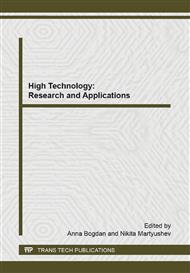[1]
A.G. Ugodchikov, N.M. Hutoryanskiy, Boundary element method in deformable solid mechanics, Kazan State University, Kazan, 1986 (in Russian).
Google Scholar
[2]
D.E. Beskos, Boundary element methods in dynamical analysis, Appl. Mech. Rev., 40(1) (1987) 1-23.
Google Scholar
[3]
D.E. Beskos, Boundary element methods in dynamical analysis. part ii (1986–1996), Appl. Mech. Rev., 50(3) (1997) 149-197.
DOI: 10.1115/1.3101695
Google Scholar
[4]
I. Chudinovich, Boundary equations in dynamic problems of the theory of elasticity, Acta Appl. Math., 65 (2001) 169-183.
Google Scholar
[5]
M. Costabel, Time-dependent problems with the boundary integral equation method, chapter 25 in: Encyclopedia of Computational Mechanics, vol. 1, Chister, Weinheim: John Wiley & Sons, New York, (2005).
DOI: 10.1002/0470091355.ecm022
Google Scholar
[6]
L. Gaul, M. Kogl, M. Wagner, Boundary element methods for engineers and scientists, Springer-Verlag Berlin Heidelberg, New York, (2003).
Google Scholar
[7]
V.Z. Parton, B.A. Kudryavtsev, Electromagnetoelasticity, Gordon and Breach, Amsterdam, (1988).
Google Scholar
[8]
A.N. Norris, Dynamic Green's functions in anisotropic piezoelectric, thermoelastic and poroelastic solids, Proc. R. Soc. Lond. A, 447 (1994) 175-188.
DOI: 10.1098/rspa.1994.0134
Google Scholar
[9]
D. Nardini, C.A. Brebbia, A new approach to free vibration analysis using boundary elements, in: C.A. Brebbia (ed. ), Boundary Element Methods in Engineering, Springer, Berlin, 1982, pp.313-326.
DOI: 10.1007/978-3-662-11273-1_22
Google Scholar
[10]
C.Y. Wang, J.D. Achenbach, Elastodynamic fundamental solution for anisotropic solids, Geophys J Int., 118 (1994) 384-392.
DOI: 10.1111/j.1365-246x.1994.tb03970.x
Google Scholar
[11]
D.E. Budreck, The elastic wave Green's function, Q. Jl. Mech. Appl. Math., 46 (1993) 1-26.
Google Scholar
[12]
V.G. Bazhenov, L.A. Igumnov, Boundary Integral Equations & Boundary Element Methods in treating the problems of 3D elastodynamics with conjugate fields, PhysMathLit, Moscow, 2008 (in Russian).
Google Scholar
[13]
M. Dravinski, T. Zheng, Numerical evaluation of three-dimensional time-harmonic Green's functions for a nonisotropic full-space, Wave Motion, 32(2) (2000) 141-151.
DOI: 10.1016/s0165-2125(00)00034-2
Google Scholar
[14]
A. Furukawa, S. Takahiro, H. Sohichi, Convolution quadrature time-domain boundary element method for 2-D and 3-D elastodynamic analyses in general anisotropic elastic solids, Engineering Analysis with Boundary Elements, 39 (2014) 64-74.
DOI: 10.1016/j.enganabound.2013.11.006
Google Scholar
[15]
R.B. Wilson, T.A. Cruze, Efficient implementation of anisotropic three dimensional boundary-integral equation stress analysis, International Journal for Numerical Methods in Engineering, 12 (1979) 1383-1397.
DOI: 10.1002/nme.1620120907
Google Scholar
[16]
F. Tonon, E. Pan, B. Amadei, Green's functions and boundary element method formulation for 3D anisotropic media, Computers and Structures, 79 (2001) 469-482.
DOI: 10.1016/s0045-7949(00)00163-2
Google Scholar
[17]
L. Banjai, M. Messner, M. Schanz, Runge-Kutta convolution quadrature for the boundary element method, Comput. Methods Appl. Mech. Engrg., 245-246 (2012) 90-101.
DOI: 10.1016/j.cma.2012.07.007
Google Scholar
[18]
A.A. Belov, L.A. Igumnov, S. Yu. Litvinchuk, Boundary element procedure based on modified convolution quadrature method in dynamic problems of elastic bodies, Problems of strength and plasticity, 70 (2008) 150-158 (in Russian).
DOI: 10.32326/1814-9146-2008-70-1-155-161
Google Scholar


